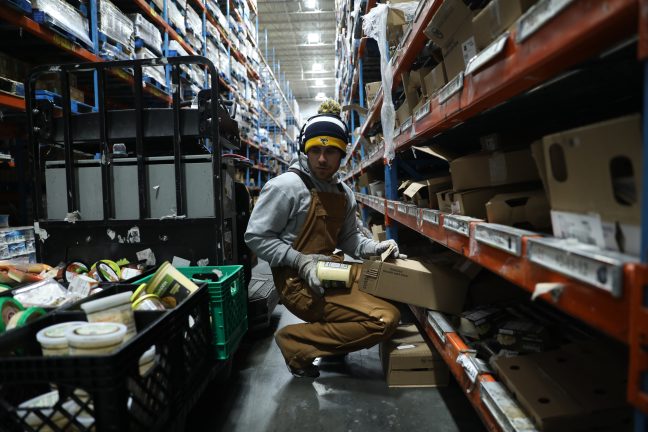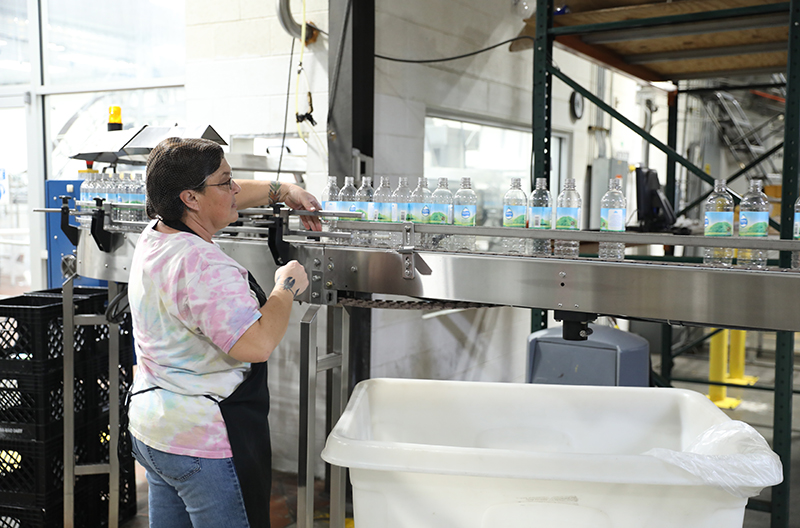Food City, The Shelby Report of the Southeast’s Retailer of the Year, has been self-distributing for a long time. Bolstered by a central distribution center in the same town as its corporate headquarters, Abingdon, Virginia, the DC is the main distributor for all Food City locations.
It continues to handle the majority of distribution for the company, according to Greg Sparks, SVP/COO. The 1.2 million-square-foot facility also houses a Misty Mountain Spring Water bottling facility, which bottles pure spring water for Food City locations as well as producing private label water for several other retailers.
Due to Food City’s growth to the west and south, the company partnered about 18 months ago with Associated Wholesale Grocers to help bring dry groceries to those areas, Sparks said.
“We were getting tight in our existing facility here. It’s a good-sized facility, but as our volume increases – and also geography – you start looking at the miles we were driving – it just made sense to partner with them,” Sparks said. “Since most of our growth is coming from their direction, they’re able to handle our growth in the next few years.”
He went on to note the need for further distribution avenues as the company looked ahead five to 10 years, describing it as “a nice problem to have, really.”

All the decisions the company makes are about putting the customer first. The DC prides itself on shipping more “single packs” than its competition. Food City locations may buy a few individual packages, whereas other distributors require a minimum purchase.
“And the whole purpose of that is to serve stores what they need to take care of our customers. If it’s an item that moves real slow, they may not want to order a full case. It all starts with the customer and we work our way back,” Sparks explained.
Food City has a dedication to freshness. While AWG does handle some distribution of dry groceries for stores farther away from the home office, all perishable items – including meat and seafood, produce and floral – come from the Abingdon DC. Food City retailers typically receive these perishables “every other day,” according to Bucky Slagle, VP of produce/floral operations.
Retail Reserve Team
The COVID-19 pandemic brought many changes to the way people conduct business. Layoffs were frequent during the shutdown, but not at Food City. Since the company’s first store opened in 1955, it has never laid off an employee, Sparks said.
When the shutdown officially began, leadership at K-VA-T Food Stores Inc., Food City’s parent company, convened to decide the best course of action to get products in stores.
Products flew off store shelves at a rapid pace. There were multiple days of shipments leaving the DC that broke previous company records.
“And we were sitting here saying, ‘How are we going to get products to the stores?’ At the time, we had about 700 associates in our distribution center. We now have over 900,” Sparks said.
It was eventually decided to establish what is now called the Retail Reserve Team. During the pandemic, one stocker associate was taken from each store around the Abingdon area, closest to the warehouse, as well as others who volunteered to help from the Corporate Support Center, and placed on a fast-tracked training program to get them in the warehouse.
Within the first week, more than 100 Food City retail employees began work in the warehouse to increase distribution.
“We did the math. We had several associates that lifted over a million pounds in a week’s time. We just had good people who wanted to get products to our stores,” Sparks said.
The Retail Reserve Team is still in effect. It consists of about 50 associates from stores in the surrounding area and the company’s headquarters. The team is most often called up when business surges, such as large holidays or major weather events are expected to drive sales.
“It does allow the distribution center to kind of flex up, keep deliveries on time, get the product to stores as needed. But it’s also helped in the development of our stores’ associates,” Sparks said.
“They see what happens in the warehouse, and they see what all goes on. And now we have all of our assistant managers, in their training process, go through a stint on the Retail Reserve Team at the warehouse.”
Flexibility proves crucial for expansion
As the Food City banner continues to extend farther from the company’s distribution center, having people to man the facility is more important. The Retail Reserve Team is a nice backup to keep up with surges of demands but how does K-VA-T retain its 900-plus associates?
“It gets down to flexibility and working with scheduling, offering incentives. We just try to be more flexible with associates,” Sparks said. “It all gets down to training to make sure people are trained. Not on how to do their job, training them about the company culture and what we’re all about. We’re all about servicing our stores so they can service our customers.”
These incentives include a 90-day referral program, perfect attendance awards and long-term benefits such as the company’s employee stock ownership program. The referral program includes two bonuses. An associate receives an initial one for bringing on a new hire. If that person completes 90 days, a second bonus is issued.
The company has been reorganizing its training program since the pandemic. Sparks said warehouse employees might previously have had a different trainer “this week, the next day or the next week. Now we’re much more structured and we have people that they primarily train.”
Within the past year, K-VA-T Food Stores has implemented a CDL driver training program that comes at no cost to associates. The program is funded wholly through partnerships with local community colleges. The associates take a 13-week course to get CDL certification. Before taking routes, newly certified drivers work alongside an experienced driver for four to six weeks. The program has seen good results, according to Sparks.

